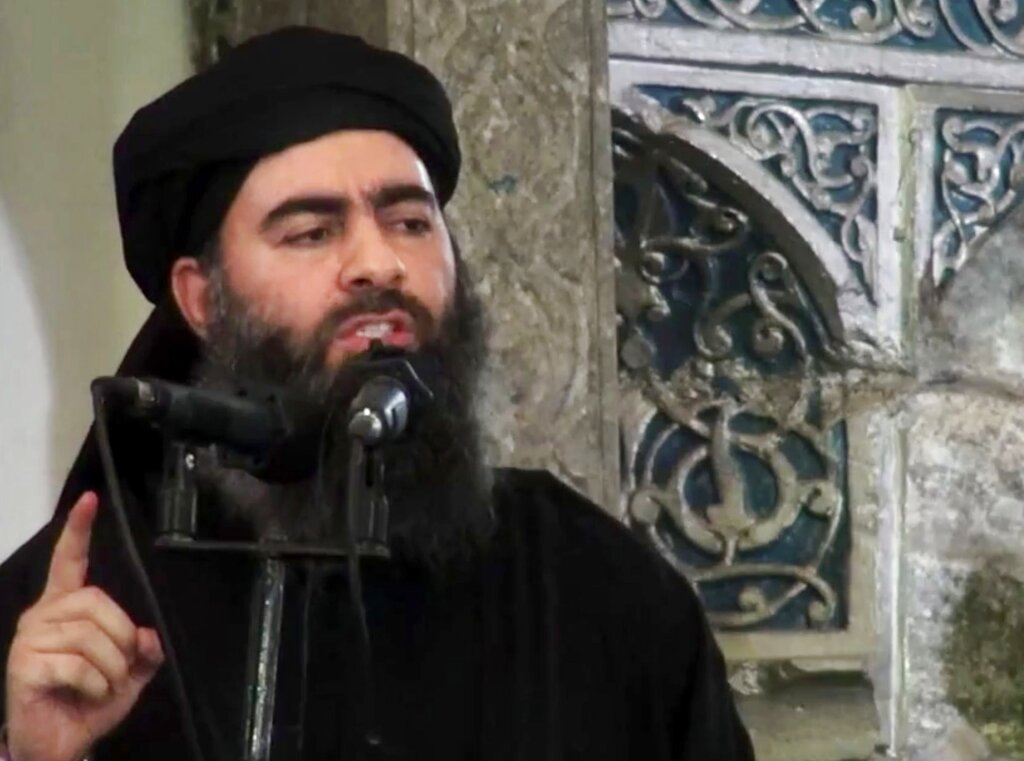President Donald Trump announced on Sunday that a commando raid in Syria this weekend had targeted and resulted in the death of Abu Bakr al-Baghdadi, the founder and leader of the Islamic State, claiming a significant victory even as American forces are pulling out of the area.
“Last night, the United States brought the world’s No. 1 terrorist leader to justice,” Trump said in an unusual nationally televised address from the White House. “Abu Bakr al-Baghdadi is dead.”
Trump said al-Baghdadi was chased to the end of a tunnel, “whimpering and crying and screaming all the way” as he was pursued by American military dogs. Accompanied by three children, al-Baghdadi then detonated a suicide vest, blowing up himself and the children, Trump said.
Al-Baghdadi’s body was mutilated by the blast, but Trump said tests had confirmed his identity. The President made a point of repeatedly portraying al-Baghdadi as “sick and depraved” and him and his followers as “losers” and “frightened puppies”, using inflammatory, boastful language unlike the more solemn approaches by other Presidents in such moments. “He died like a dog,” Trump said. “He died like a coward.”
Trump said American forces, ferried by eight helicopters through airspace controlled by Russia with Moscow’s permission, were met by hostile fire when they landed and entered the target building by blowing a hole through the wall rather than taking a chance on a booby-trapped main entrance. No Americans were killed in the operation, although Trump said one of the military dogs was injured.
Trump, who is under threat of impeachment, appeared eager to claim credit for the raid, engaging in a lengthy question-and-answer session with reporters after his statement as he personally walked them through the details, promoted his own role and compared himself favourably to past Presidents.
The White House released a photograph of Trump surrounded by top advisers on Saturday in the Situation Room where he monitored the raid on al-Baghdadi’s hideout in Syria, much like the famed image of President Barack Obama watching the raid that killed Osama bin Laden in 2011. He even seemed to suggest that killing al-Baghdadi was a bigger deal than killing bin Laden.
Al-Baghdadi never occupied the same space in the American psyche as bin Laden but proved to be a tenacious and dangerous enemy of the US and its allies in West Asia.
The son of a sheepherder from Iraq, al-Baghdadi, 48, was arrested by occupying American forces in 2004 and emerged radicalised from 11 months of captivity and came to assemble a potent terrorist force that overtook al Qaida. He promoted a virulent form of Islam and at one point controlled a swath of territory the size of Britain.
For Trump, a successful operation against al-Baghdadi could prove both a strategic victory in the battle against the IS and a politically useful counterpoint to critics in both parties who have assailed him in recent weeks for withdrawing American troops from northern Syria, which allowed Turkey to attack and push out America’s Kurdish allies. A senior American official confirmed that Kurdish intelligence officials in both Syria and Iraq helped locate the target of the raid despite the tensions over the Turkish operation.
Al-Baghdadi has been incorrectly reported killed before, and American military officials were concerned that Trump, who posted a cryptic message on Twitter on Saturday night teasing his Sunday announcement, was so eager to announce the development that he was getting ahead of the forensics.
A defence department official said before the President’s announcement that there was a strong belief — “near certainty” — that al-Baghdadi was dead, but that a full DNA analysis was not complete. The official said that with any other President, the Pentagon would wait for absolute certainty before announcing victory. But Trump was impatient to get the news out, the official said.
Critics of the President’s decision to withdraw American forces quickly argued that the operation took place in spite of, not because of, Trump and that if the military had not slow-rolled his plan to withdraw, the raid would not have been possible.
The American commando raid took place on Saturday in Idlib, hundreds of miles from the area along the Syrian-Iraqi border where al-Baghdadi had been believed to be hiding, according to senior officials. Counterterrorism experts expressed surprise that al-Baghdadi was hiding in an area dominated by al Qaida groups so far from his strongholds.
However, the IS has extensively penetrated Idlib since the fall of Raqqa, its stronghold in northeastern Syria, in late 2017. The American operation on Saturday took place in a smuggling area near the Turkish border where numerous IS foreign fighters have likely traversed, said Jennifer Cafarella, research director for the Institute for the Study of War in Washington.
“It could be that he believed the chaos of Idlib would provide him with the cover he needed to blend in among hordes of extremists and other rebels,” said Colin P. Clarke, a senior fellow at the Soufan Centre, a research organisation for global security issues.
But there is also a more ominous possibility of why al-Baghdadi was in Idlib. “Baghdadi’s presence in al Qaida-dominated areas could signal many things,” Cafarella said. “Most dangerous among them is resumed negotiations between him and al Qaida leaders for reunification and/or a collaboration on attacks against the West.”











